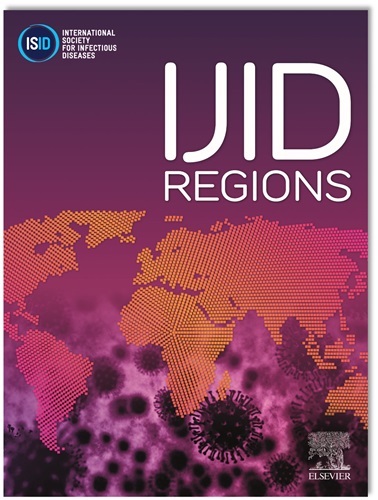针对结核分枝杆菌的 mRNA 纳米疫苗可激发小鼠的强大免疫力
IF 4.8
2区 医学
Q1 INFECTIOUS DISEASES
引用次数: 0
摘要
由结核分枝杆菌(M.tb)引起的结核病(TB)仍然是一个主要的全球卫生问题。尽管有卡介苗,但迫切需要更有效的结核病疫苗。在此,我们开发了一种靶向结核分枝杆菌关键抗原的mRNA纳米佐剂疫苗,并在小鼠模型中评估了其免疫原性和保护效果。方法用10µg编码Ag85B、Hsp70和ESAT-6的mRNA,通过皮下或鼻内免疫sc57bl /6小鼠(N=15/组),每隔4周免疫一次。接种PBS或BCG的小鼠分别作为未接种和阳性对照。用结核分枝杆菌纯化蛋白衍生物(PPD)、Ag85B和HSP70纯化蛋白刺激脾细胞和肺细胞,评价疫苗的免疫原性和保护性免疫。流式细胞术检测细胞免疫应答。结果mRNA纳米佐剂疫苗在免疫小鼠中引起了与卡介苗相当的细胞和体液免疫应答。免疫后检测到抗原特异性IgG抗体水平升高。此外,观察到抗原特异性T细胞产生显著的IFN-γ、TNF-a、IL-17A和IL-2。总的来说,mRNA纳米疫苗诱导了强大的T细胞反应,其特征是激活了多功能的记忆和效应T细胞群。我们的研究结果强调了编码免疫原性抗原的mRNA纳米佐剂疫苗作为结核病疫苗开发的有希望的候选疫苗的潜力。这种疫苗强有力地引发了一种已知对动物和人类的结核分枝杆菌感染具有保护作用的免疫谱。有必要进一步研究以优化疫苗配方,并在更大的动物模型和临床试验中评估其长期保护功效和安全性。结论本研究阐明了编码结核分枝杆菌免疫优势抗原的mRNA疫苗在小鼠体内具有良好的免疫原性,佐剂和不同给药途径可显著增强疫苗的免疫原性。对小鼠体重没有不良影响,再加上优越的免疫反应,证实了这种疫苗接种策略对结核分枝杆菌的有效性。未来的研究工作应侧重于评估该疫苗在更相关的结核分枝杆菌感染模型(如非人灵长类动物)中的表现,并评估其预防结核病的潜力。本文章由计算机程序翻译,如有差异,请以英文原文为准。
mRNA Nanovaccine Against Mycobacterium tuberculosis Elicits Robust Immunity in Mice
Background
Tuberculosis (TB), caused by Mycobacterium tuberculosis (M.tb), remains a major global health concern. Despite the availability of Bacillus Calmette-Guérin (BCG) vaccine, there is an urgent need for more effective TB vaccines. Here, we developed an mRNA nanoadjuvant vaccine targeting key M.tb antigens and evaluated its immunogenicity and protective efficacy in a murine model.
Methods
C57BL/6 mice (N=15/group) were immunized with a two-dose regimen of 10 µg mRNA encoding Ag85B, Hsp70, and ESAT-6 at 4-week intervals through the subcutaneous or intranasal routes. Mice vaccinated with PBS or BCG served as unvaccinated and positive controls, respectively. The immunogenicity and protective immunity of the vaccine were evaluated by stimulating splenocytes and lung cells with M.tb purified protein derivative (PPD), Ag85B, and HSP70 purified proteins. Cellular immune responses were assessed by flow cytometry.
Results
The mRNA nanoadjuvant vaccine elicited robust cellular and humoral immune responses in immunized mice comparable to BCG. Elevated levels of antigen-specific IgG antibodies were detected post-immunization. Additionally, significant IFN-γ, TNF-a, IL-17A, and IL-2 production by antigen-specific T cells was observed. Overall, mRNA nanovaccines induce robust T cell responses characterized by activation of both memory and effector T cell populations that are polyfunctional.
Discussion
Our findings highlight the potential of the mRNA nanoadjuvant vaccine encoding immunogenic antigens as a promising candidate for TB vaccine development. This vaccine robustly elicited an immune profile that is known to be protective against M.tb infection in both animals and humans. Further studies are warranted to optimize the vaccine formulation and evaluate its long-term protective efficacy and safety in larger animal models and clinical trials.
Conclusion
This study elucidates the promising immunogenicity of mRNA vaccines encoding M.tb immunodominant antigens in mice, with adjuvant and diverse administration routes significantly enhancing vaccine immunogenicity. The absence of adverse effects on mice body weight, combined with superior immune responses, validates the effectiveness of this vaccination strategy against M.tb. Future research endeavors should focus on evaluating the vaccine's performance in more relevant models of M.tb infection, such as non-human primates, and assessing its potential to prevent TB disease.
求助全文
通过发布文献求助,成功后即可免费获取论文全文。
去求助
来源期刊
CiteScore
18.90
自引率
2.40%
发文量
1020
审稿时长
30 days
期刊介绍:
International Journal of Infectious Diseases (IJID)
Publisher: International Society for Infectious Diseases
Publication Frequency: Monthly
Type: Peer-reviewed, Open Access
Scope:
Publishes original clinical and laboratory-based research.
Reports clinical trials, reviews, and some case reports.
Focuses on epidemiology, clinical diagnosis, treatment, and control of infectious diseases.
Emphasizes diseases common in under-resourced countries.

 求助内容:
求助内容: 应助结果提醒方式:
应助结果提醒方式:


